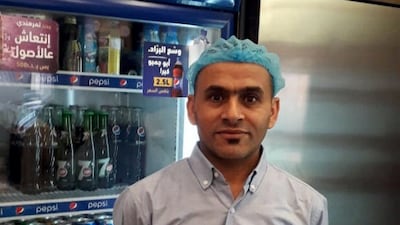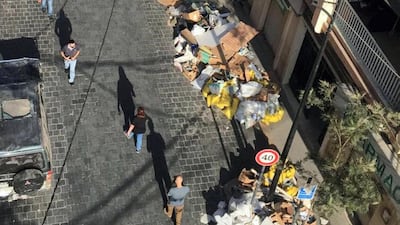When veteran restaurateur Charbel Bassil parked his 29-year-old Volvo in Beirut two weeks ago, he did what he always does before getting out of the car.
His father Francois, founder of Le Chef restaurant in the East Beirut district of Gemayzeh, had taught his son to crank down the windows in case of an explosion.
The grey station wagon, parked off Rue Gouraud, the main street in the district, suffered less damage than nearby cars when the huge explosion hit the port on August 4, killing at least 177 people.
Mr Bassil used the car to rush his two Syrian workers, Fayez and Fahed, to hospital. Fayez was in a coma in intensive care for days, and he is still in hospital, awaiting possible surgery.
On the way to the hospital, the 51-year-old restaurant owner picked up two more injured people from Rue Gouraud.
“There was not much glass inside the Volvo because I always keep the windows open,” Mr Bassil told The National.
The disaster is testing resilience at Le Chef, one of Beirut’s most venerable dining institutions. Its fortunes in the past five decades have echoed Lebanon’s turbulent history of war and peace.
The explosion was so close to Gemayzeh and of such magnitude that it forced Le Chef to close for the first time since Francois Bassil opened the restaurant on May 1, 1967.

His two brothers, the foul and fatteh specialist Antoun and the waiter Boutros, were his partners.
When it was operational, Le Chef was so well run that its home-style food was ready to serve almost as soon as Mr Bassil would shout the order into the elevated kitchen.
Its delivery service was also popular among office workers and elderly people who could not cook for themselves.
Relatively low prices attracted salaried workers, but artists and members of the intelligentsia and high-paid professionals also liked the food and the ambience of the restaurant with its wooden panels and a large painting hanging on one of the walls.
Le Chef's elder generation all died of natural causes in the past decade, except for Mr Bassil’s uncle Boutros.
He was run over by a car driven by a thief escaping a robbery in the Bassil home village of Daraoun, in Mount Lebanon.
Mr Bassil still lives in Daraoun, which overlooks the Bay of Jounieh, and is near the famed Maronite basilica of Harissa.
Francois Bassil left Daraoun to work as a chef in Iraq, before the 1958 revolution forced him to return to Lebanon.
Like his father did, Mr Bassil processes the supply chain through his computer-like mind to ensure every ingredient used is fresh.
He speaks fluent English and French, and seems to have picked up from Le Chef’s clientele every other language on Earth.
His brother Paul replaced Francois Bassil as the chef. The rest of the staff are a cousin, Collette, and a neighbour, Michelin, who handles the cash register, as well a team of mostly Syrian and Bangladeshi workers.
As hostile sentiment and violence against Syrian refugees increased in Lebanon in the past 15 years, Le Chef remained immune.
Fayez rose from being a busboy to assistant chef, and Mr Bassil relies on Fahed to run Le Chef when he is away.
Mr Bassil said that until recently, people from all sects stopped by the restaurant to tell him that his father, Francois, hired them at Le Chef. They were thankful, because “without him they would not have had experience to go work in the Gulf”, he said.
At the outset of the Lebanese civil war in 1975, Francois Bassil used his connections to hide his Muslim staff at the police station farther down Rue Gouraud, until they managed to flee to safety.
“Killings started according to the religion stamped on one’s ID, and my father feared for his Muslim workers,” Mr Bassil said.
Sectarianism, he said, “is not good for business”.
High inflation and the collapse of the Lebanese pound that started last year forced Le Chef to raise prices.
Activity was restricted to the delivery business for two to three months this year because of the coronavirus.
When the port explosion occurred a little after 6pm local time, there were only two customers at Le Chef.
One was unhurt and the other, who was sitting at the window, managed to walk by himself to a clinic in Gemayzeh.
It was off-peak hours.
But business has been very slow in general since the economic crisis started last year.
Mr Bassil laid off five workers, mostly Syrian, from his 12 permanent staff.
Local purchasing power has declined sharply and tourists who usually make Le Chef a prime destination in Beirut have stopped coming.
Le Chef had gained renown beyond Lebanon’s borders. Russel Crowe donated $5,000 (Dh18,364) to repair it, in memory of celebrity cook Anthony Bourdain, who spoke glowingly about the small restaurant.
The fund-raising page has garnered more than $18,000 in donations since the explosion.
Mr Bassil said the economic collapse “alone was disastrous – then came the coronavirus and the explosion".
“I inherited from my father and uncles the love of the people,” he said.
“We will continue.”














